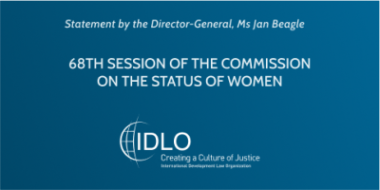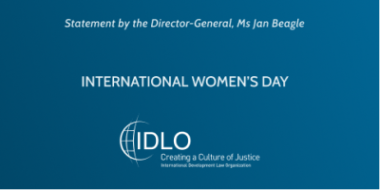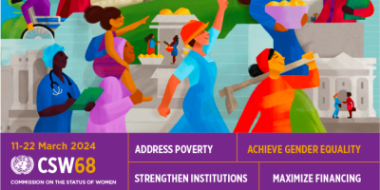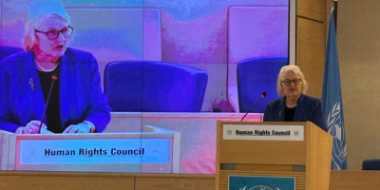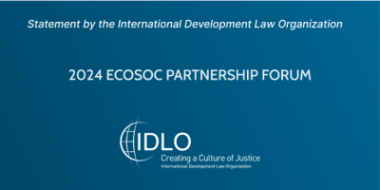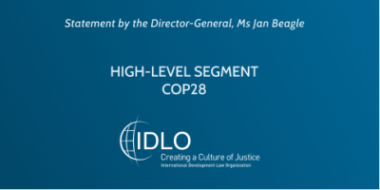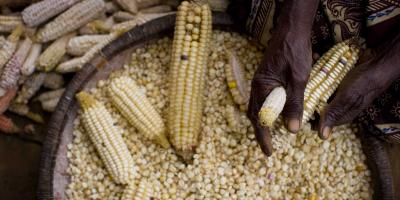
This blog post is co-authored by Françoise Trine, Senior Food Security Officer, Secretariat of the Committee on World Food Security (CFS) and Dr. Ilaria Bottigliero, Director, Policy, Research and Learning, International Development Law Organization (IDLO).
Evidence from around the world shows that women are disproportionately affected by economic shocks and crises. The COVID-19 pandemic is no exception. Women are hard hit as individuals and in their ability to fulfil their role in terms of contribution to the food security and nutrition of their family, while tens of millions of poor people are at risk of falling into food insecurity as a result of COVID-19.
As literature has abundantly shown, women play key roles in food security in all societies, as income earners and as food and nutrition managers in their households, preparing food and caring for all household members, especially children, the sick, and the elderly. But women face far greater constraints than men in contributing their full potential to food security and nutrition, and the COVID-19 pandemic is making the situation worse.
The differentiated impact of the pandemic on women and men varies from country to country, depending on the roles assigned to women and men by society and the nature and severity of structural discrimination against women, which limits women’s ability to cope with the crisis.
Progress toward the goal of promoting gender equality in recent decades is being adversely affected by the COVID-19 pandemic.
The centrality of gender equality and women’s empowerment to development is made explicit in the 2030 Agenda for Sustainable Development and its Sustainable Development Goals, both as a stand-alone goal, SDG5, and as a cross-cutting theme across other goals.
A 2019 Justice for Women Report by IDLO, UN Women and the World Bank, analysed areas in which women suffer discrimination and are prevented from participating in society on an equal basis. Using this analysis as a starting point, one could see how structural discrimination and justice gaps exacerbate the effects of COVID-19 on women and girls and directly impact food security and family nutrition:
1. Discrimination at work. Full participation of women in the labour market could lead to an estimated 26% boost in global GDP (McKinsey Global Institute). However, legislation is often discriminatory towards women at work and there are important barriers to women’s entrepreneurship everywhere, especially for married women.
Over 2.7 billion women are legally restricted from having the same choice of jobs than men (World Bank).
According to the World Bank, 155 countries have at least one law that limits women’s economic opportunities, while 100 countries place restrictions on the types of jobs women can do and 18 countries allow husbands to decide whether their wives can work at all (World Bank).
This has contributed to the over-representation of women in informal, low-paid and precarious jobs, which are not covered by social protection plans being implement by governments in the context of COVID-19. The situation is made worse by the fact that lockdown and confinement measures have severely affected female-dominated industries, including retail, accommodation services, and food and beverage service activities. The service sector – where, globally, about 59 per cent of women work -- is reeling under restrictions, closures, and bankruptcies (IDLO, UN Women). This puts many women’s jobs and their economic security at risk.
In the current emergency situation, women’s ability to work is also reduced by increased care demands caused by the closure of schools, home confinements and the need to care for ill family members - a task which mostly falls on women. Women’s lost income heightens their vulnerability to poverty and negatively impacts the food security and nutrition of their families.
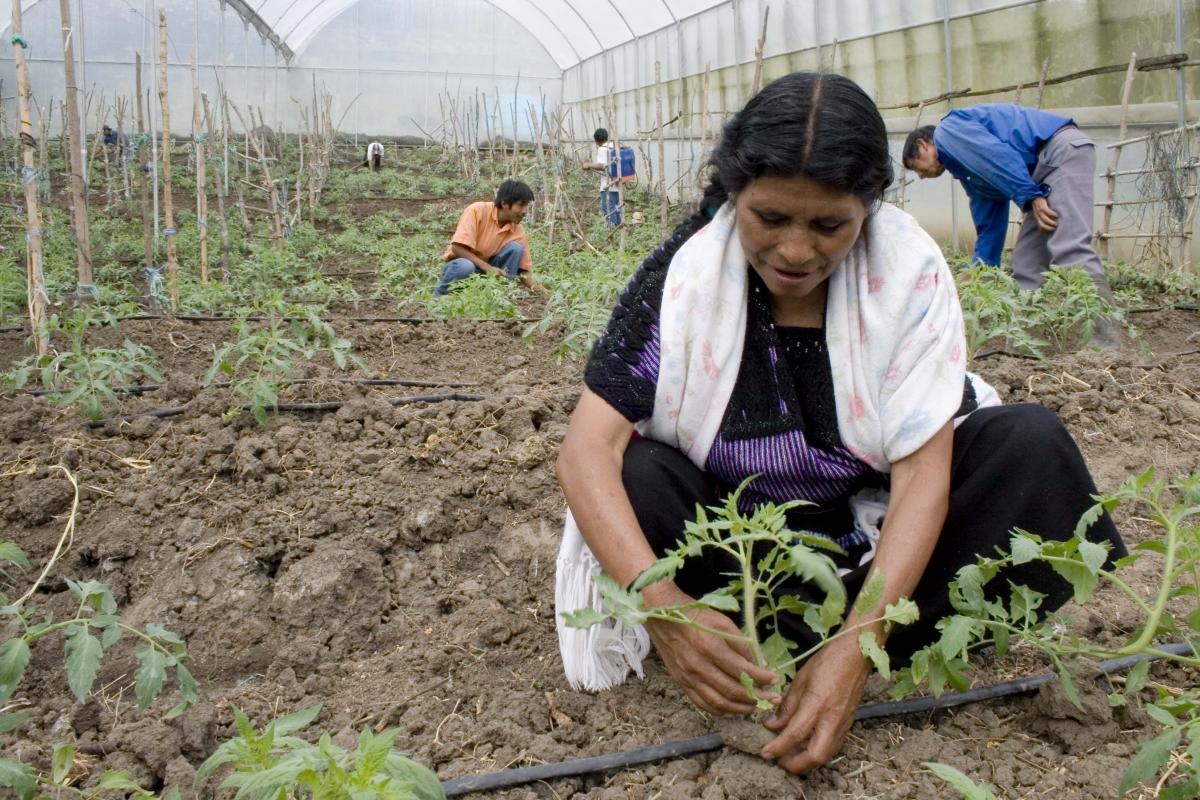 2. Access and control over land and natural resources are important elements for generating income and livelihood opportunities, especially in rural areas. They can also be used as collateral to get loans from banks or community institutions when needed.
2. Access and control over land and natural resources are important elements for generating income and livelihood opportunities, especially in rural areas. They can also be used as collateral to get loans from banks or community institutions when needed.
Globally, while more employed women than men are working in agriculture, forestry and fisheries, only 13.8% of landholders are women (UN Women). Women’s property rights are often restricted in law and practice (CFS). Property rights are especially insecure for women whose use of land depends on their husband or male relatives. In some cases, formal registration of property can only be made under a head of household, who is often male (IDLO).
Health crises such as COVID-19, conflict and disaster situations expose women, in particular widows, to the risk of property grabbing. Insufficient financial resources, lack of legal documents or information can weaken their capacity to enforce their rights on land and natural resources. In low income countries, 45% of women lack an identity document compared with 30% of men (High-level Group on Justice for Women). The possession of a ‘legal identity’ influences a woman’s ability to protect her rights and access benefits and services. Women need legal documents to own property such as land, businesses, or even for employment.
3. Discriminatory practices in family life, codified by law, are major obstacles. Women worldwide are often subjected to discriminatory laws and practices. For example, child marriage has large economic costs on fertility, population growth and education, as well as earnings (World Bank). Worsening economic conditions under COVID-19 are likely to increase child marriage as a result of families trying to cope with job losses and economic hardship.
4. Exclusion from decision-making. Women continue to be excluded or under-represented in senior management in the public and private sectors across most countries, with limited participation in decision-making. For example, in 2017 only 24% of constitutional court justices worldwide were women. Due to their exclusion from networks and power structures, women tend to be disadvantaged in terms of access to critical information, including on COVID-19. They also tend to be excluded from essential decision-making processes shaping national and global responses to the pandemic.
Women leaders should be informed and involved in shaping a gender-sensitive and inclusive COVID-19 response, ensuring women’s specific constraints and needs are understood and addressed.
5. Sexual and gender-based violence. During public health emergencies, the physical, psychological and time burden of caregiving on women increases thereby exacerbating pre-existing gender equalities and increasing threat of all forms of GBV (UNFPA). Such risks of violence are especially high for women and girls belonging to marginalized groups and/or at risk of multiple discrimination depending notably on their social or ethnic/national origin, such as for example women with disabilities, rural women, elderly women, migrant and asylum-seeking women. The ongoing home confinement due to COVID-19 has resulted in increased prevalence of domestic violence due to economic and social stress brought on by the pandemic.
More than 1 billion women do not have protection from partner sexual violence which is estimated to cost about 1.5% of global Gross Domestic Product (World Bank).
What can be done?
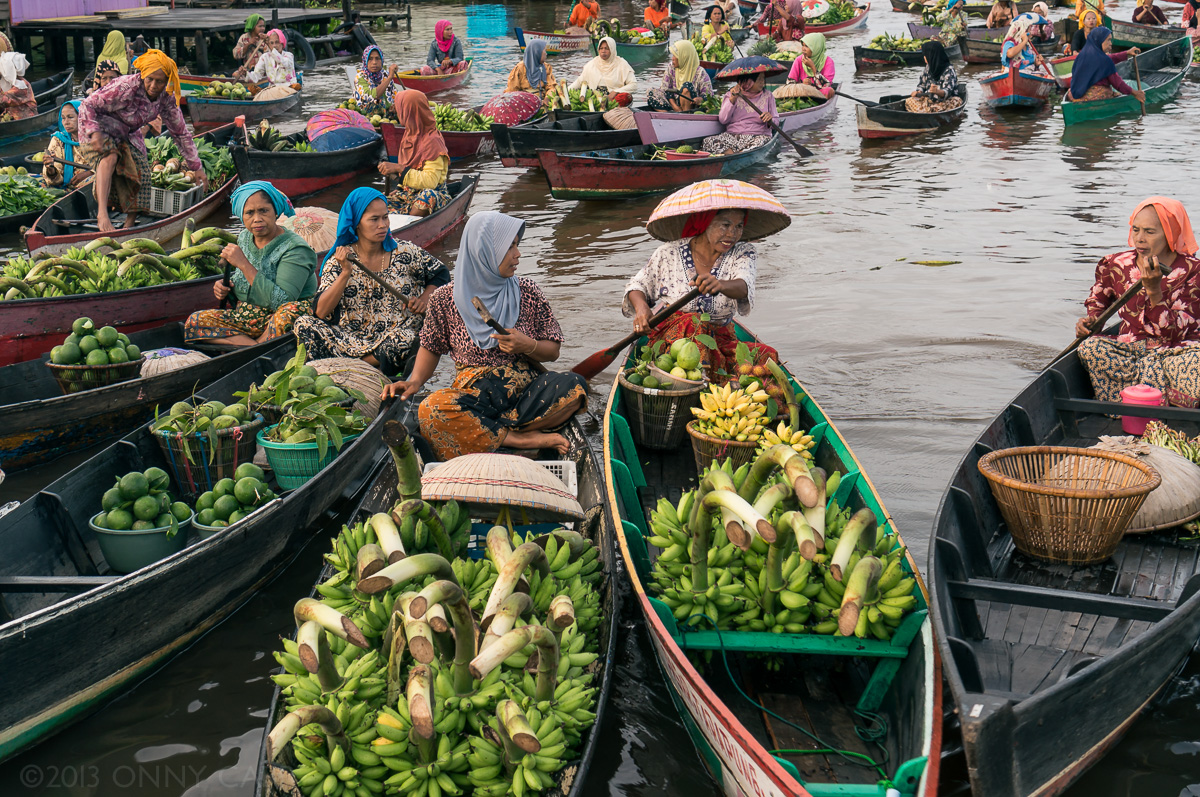 Governments and other actors are called upon to design and implement stimulus packages that take into account the disproportionate impact of the COVID-19 pandemic and accompanying economic and food security and nutrition crisis on women. These packages should address structural gender-based discrimination, including in law and its application, and contribute to a more resilient and equitable society in the long term.
Governments and other actors are called upon to design and implement stimulus packages that take into account the disproportionate impact of the COVID-19 pandemic and accompanying economic and food security and nutrition crisis on women. These packages should address structural gender-based discrimination, including in law and its application, and contribute to a more resilient and equitable society in the long term.
Eliminating structural gender-based discrimination is not only a basic human rights obligation, but an essential contribution to achieving the global SDG targets associated with food security and nutrition. Massive economic losses are associated with gender discrimination. Investing in women produces high returns in human development, national income and economic growth.
Output losses associated with current levels of gender discrimination are estimated at USD 12 trillion annually, or 16% of global GDP (OECD).
The Committee on World Food Security (CFS) plans to develop Voluntary Guidelines on Gender Equality and Women’s Empowerment in the Context of Food Security and Nutrition”, starting in October 2020 and finishing in 2022. These Guidelines will provide policy guidance to countries and other actors as part of efforts to eradicate hunger, food insecurity, and malnutrition. The Guidelines are intended to address all forms of discrimination against women, including discriminatory social norms and practices, and to contribute to the implementation of the Convention on the Elimination of All Forms of Discrimination against Women (CEDAW).
The views expressed in this information product are those of the authors and do not necessarily reflect the views of the Committee on World Food Security (CFS) and the International Development Law Organization (IDLO).
Photos from top to bottom: © Flickr_ Creative Commons_Kate Holt, © FAO Mexico, © Flickr_Creative Commons_Onny Carr


